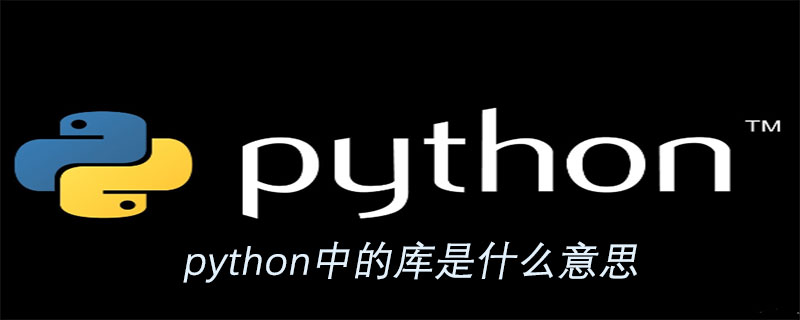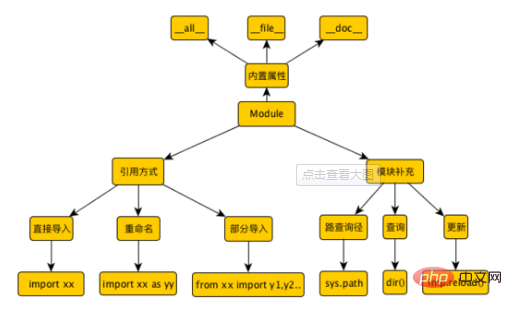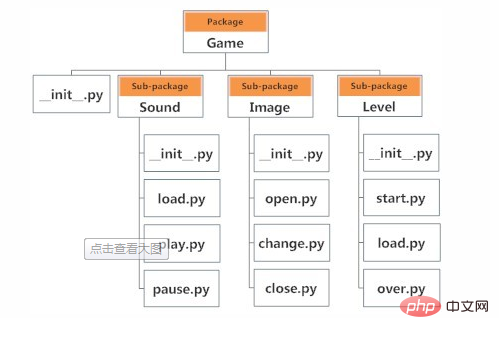What does library mean in python

Friends who are new to python must have encountered such a problem, python modules, python packages, python libraries... I feel confused. Today I will talk about modules in python. What is the difference between libraries and packages?
1. python module is:
python module: Contains and organized code snippets as modules.
The expression is: the written code is saved as a file. This file is a module. sample.py where the file name smaple is the module name.
Relationship diagram:

2. The python package is:
The package is A hierarchical file directory structure that defines a python application execution environment consisting of n modules or n sub-packages. In layman's terms: a package is a directory containing an __init__.py file. This directory must have this __init__.py file and other modules or sub-packages.
FAQ:
Introduce a module under a specific path
Use sys.path.append(yourmodulepath)
Add a path to the python system path to avoid specifying the path through code every time
Use the system environment variable export PYTHONPATH=$PYTHONPATH:yourmodulepath,
directly add this The path links to a directory similar to /Library/Python/2.7/site-packages
Good advice:
Always use if __name__ == '__main__', make sure to write The package can be imported or run independently for testing.
Multiple imports will not execute the module multiple times, but only once. You can use reload to force the module to run, but it is not recommended.
The common package structure is as follows:
package_a├── __init__.py├── module_a1.py└── module_a2.pypackage_b├── __init__.py├ ── module_b1.py└── module_b2.py
main.py
If main.py wants to reference the module modulea1 in packagea, you can use:
from package_a import module_a1
import package_a.module_a1
If modulea1 in packagea needs to reference packageb, then by default, python cannot find packageb . We can use sys.path.append('../'), add this sentence to __init__.py in packagea, and then add * import __init_ to all modules in the package.
Relationship diagram:

##3. Library (library)
The concept of a library is to have A collection of related functional modules. This is also one of the major features of Python, that is, it has a powerful standard library, third-party libraries and custom modules.The above is the detailed content of What does library mean in python. For more information, please follow other related articles on the PHP Chinese website!

Hot AI Tools

Undresser.AI Undress
AI-powered app for creating realistic nude photos

AI Clothes Remover
Online AI tool for removing clothes from photos.

Undress AI Tool
Undress images for free

Clothoff.io
AI clothes remover

AI Hentai Generator
Generate AI Hentai for free.

Hot Article

Hot Tools

Notepad++7.3.1
Easy-to-use and free code editor

SublimeText3 Chinese version
Chinese version, very easy to use

Zend Studio 13.0.1
Powerful PHP integrated development environment

Dreamweaver CS6
Visual web development tools

SublimeText3 Mac version
God-level code editing software (SublimeText3)

Hot Topics
 1385
1385
 52
52
 How to solve the permissions problem encountered when viewing Python version in Linux terminal?
Apr 01, 2025 pm 05:09 PM
How to solve the permissions problem encountered when viewing Python version in Linux terminal?
Apr 01, 2025 pm 05:09 PM
Solution to permission issues when viewing Python version in Linux terminal When you try to view Python version in Linux terminal, enter python...
 How to teach computer novice programming basics in project and problem-driven methods within 10 hours?
Apr 02, 2025 am 07:18 AM
How to teach computer novice programming basics in project and problem-driven methods within 10 hours?
Apr 02, 2025 am 07:18 AM
How to teach computer novice programming basics within 10 hours? If you only have 10 hours to teach computer novice some programming knowledge, what would you choose to teach...
 How to efficiently copy the entire column of one DataFrame into another DataFrame with different structures in Python?
Apr 01, 2025 pm 11:15 PM
How to efficiently copy the entire column of one DataFrame into another DataFrame with different structures in Python?
Apr 01, 2025 pm 11:15 PM
When using Python's pandas library, how to copy whole columns between two DataFrames with different structures is a common problem. Suppose we have two Dats...
 How to avoid being detected by the browser when using Fiddler Everywhere for man-in-the-middle reading?
Apr 02, 2025 am 07:15 AM
How to avoid being detected by the browser when using Fiddler Everywhere for man-in-the-middle reading?
Apr 02, 2025 am 07:15 AM
How to avoid being detected when using FiddlerEverywhere for man-in-the-middle readings When you use FiddlerEverywhere...
 What are regular expressions?
Mar 20, 2025 pm 06:25 PM
What are regular expressions?
Mar 20, 2025 pm 06:25 PM
Regular expressions are powerful tools for pattern matching and text manipulation in programming, enhancing efficiency in text processing across various applications.
 How does Uvicorn continuously listen for HTTP requests without serving_forever()?
Apr 01, 2025 pm 10:51 PM
How does Uvicorn continuously listen for HTTP requests without serving_forever()?
Apr 01, 2025 pm 10:51 PM
How does Uvicorn continuously listen for HTTP requests? Uvicorn is a lightweight web server based on ASGI. One of its core functions is to listen for HTTP requests and proceed...
 What are some popular Python libraries and their uses?
Mar 21, 2025 pm 06:46 PM
What are some popular Python libraries and their uses?
Mar 21, 2025 pm 06:46 PM
The article discusses popular Python libraries like NumPy, Pandas, Matplotlib, Scikit-learn, TensorFlow, Django, Flask, and Requests, detailing their uses in scientific computing, data analysis, visualization, machine learning, web development, and H
 How to dynamically create an object through a string and call its methods in Python?
Apr 01, 2025 pm 11:18 PM
How to dynamically create an object through a string and call its methods in Python?
Apr 01, 2025 pm 11:18 PM
In Python, how to dynamically create an object through a string and call its methods? This is a common programming requirement, especially if it needs to be configured or run...




